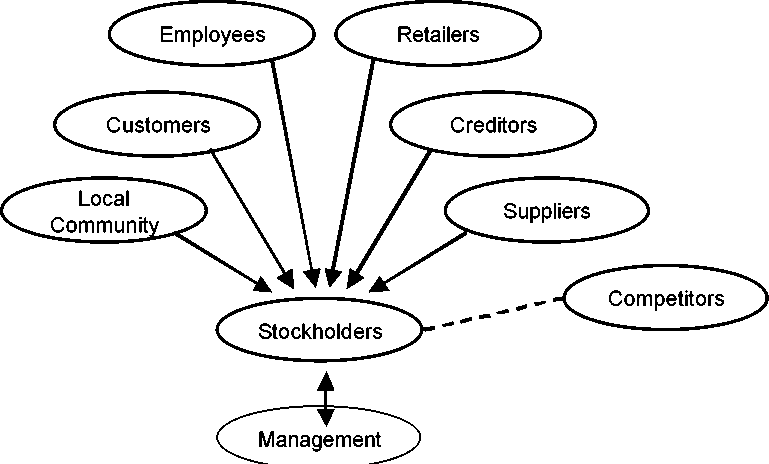Henn’s [27] Handbook of the Law of Corporations states that the duty of management is to be
obedient and loyal (to the stockholder). Finally, Blumberg [7], in his review of legal trends, finds little
change since the 1920s in the legal primacy of stockholder interests.
In other words, the legal system has relieved the manager of responsibility for assessing the impact
of his decisions upon other interest groups. He should only be concerned with these groups to the extent
that they affect the well-being of the stockholder. For example, air pollution is acceptable if there is no
response from the public, and, therefore, no threat to profit-maximization. Something would be done,
however, if it were expected that air pollution might lead to a boycott of the firm’s products.
The relationship of management to the stockholders and to the other interest groups under the
stockholder role is illustrated in Fig. 1. One-way arrows are used between the interest groups and the
stockholder, implying that the group must take the initiative to have its interests recognized by the firm.
Figure 1: Stockholder Theory

The stockholder role advocates that the manager distributes rewards to maximize the returns to the
stockholder. Since the market is generally imperfect, decisions to maximize the benefits to the
stockho1der can often be accomplished at the expense of the other interest groups. Consider again the
case of air pollution; the local community provides a resource (clean air) to the firm and, in return, it
receives dirty air. The stockholder gains in this transaction, and the local community loses.
As the imperfections of the market increase (e.g., as entry of new competitors is restricted, as
collusion among competitors increases, as free choice by the consumers is restricted, or as the flow of
information is distorted) the relative gain to the stockholder can be increased, while other interest groups
receive less. As a result, the manager following the stockholder role is encouraged to take action that
will reduce the effectiveness of the free market. The stockholder role encourages the manager to create
More intriguing information
1. The name is absent2. The name is absent
3. Les freins culturels à l'adoption des IFRS en Europe : une analyse du cas français
4. The name is absent
5. Empirical Calibration of a Least-Cost Conservation Reserve Program
6. The name is absent
7. The name is absent
8. Fiscal Rules, Fiscal Institutions, and Fiscal Performance
9. The Impact of Optimal Tariffs and Taxes on Agglomeration
10. Backpropagation Artificial Neural Network To Detect Hyperthermic Seizures In Rats